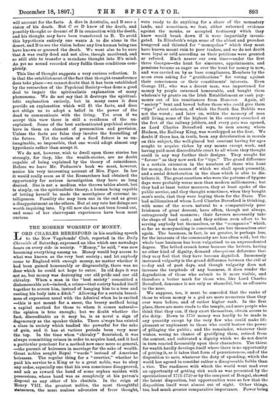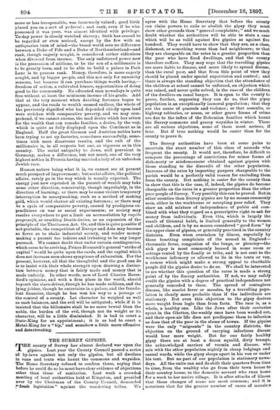THE MODERN WORSHIP OF MONEY.
LORD CHARLES BERESFORD in his scathing speech to the New Vagabonds' Club, reported in the Daily Chronicle of Saturday, expressed an idea which one nowadays "wars on every side in society. "Money," he said, "was now becoming everything among us. Money would buy access to what was known as the very best society ; and let anybody 'come to England with enough money, no matter whether it had been gained honourably or disgracefully, there was no door which he could not hope to enter. In old days it was not so, but money was destroying our old pride and our old .chivalry. When a man in the best society' committed a dishonourable act—indeed, a crime—that society banded itself together to screen him, instead of hanging him to a tree and casting his body into a ditch." Allowing for a certain breezi- ness of expression usual with the Admiral when he is excited —this is not meant for a sneer, the breezy method being a capital method for those to whom it comes natural— the opinion is true enough; but we doubt whether the fact, discreditable as it may be, is as novel a sign of degeneracy as the speaker thinks. There always has existed a class in society which toadied the powerful for the sake of gain, and it has at various periods been very near the top. In the time when " chivalry " flourished, it was always committing crimes in order to acquire land, and it had a .particular penchant for a method now once more so general, —the pursuit of heiresses in marriage for the sake of wealth. Great nobles sought Royal " wards " instead of American heiresses. The regular thing for a "courtier," whether he "aid his service to a King or to a great noble, was to obey any order, especially one that his own conscience disapproved, and ask as reward the hand of some orphan maiden with possessions, whose hand was as completely at his patron's disposal as any other of his chattels. In the reign of Henry VIII. the greatest nobles, the most thoughtful statesmen, the most zealous advocates of freer thought, were ready to do anything for a share of the monastery lands, and sometimes, we fear, either suborned evidence against the monks, or accepted testimony which they knew would break down if it were impartially investi- gated. In Elizabeth's reign some of the ablest and proudest hungered and thirsted for " monopolies " which they must have known meant rain to poor traders, and we do not doubt were loyal or cold according as their petitions were granted or refused. Mach nearer our own time—under the first three Georges—the hunt for sinecures, appointments, and pensions became as eager as ever the hunt for money is now, and was carried on by as base compliances, Members by the score even asking for " gratifications " for voting against their consciences or their constituents' interests. Even George III., who was a decent man, was importuned for money by people esteemed honourable, and bought them wholesale by grants on the Irish Establishment or cash pay- ments out of his remittances from Hanover. Again, all " society " bent and bowed before those who could give them " tips " about schemes, of which the South Sea Bubble was not the worst ; and later on, within the memory of men still living, some of the highest in the country crouched at the feet of the railway jobbers, and every gate was opened, as Lord Charles Beresford says, to men among whom Hudson, the Railway King, was worshipped as the first. We doubt if there has, in truth, been any deterioration in morals on this subject, the well-placed but esurient having for ages sought to acquire riches by any means except work, and having paid most discreditable court to all whom they thought could in any way farther their designs. They sought for " favour " as they now seek for "tips." The grand difference is a certain extension in the numbers of those who hunt for money, due to causes of which we shall speak presently, and a social deterioration in the class which is able to die- tribute it. The great courtiers who were the patrons of bygone days were probably worse men than modern millionaires ; but they had at least better manners, they at least spoke of the public service, and they thought sometimes, when they bought men's souls, that they were buying them for the State. The bad millionaires of whom Lord Charles Beresford is thinking, with some of the scorn natural to a comparatively poor Irishman of great descent, have often, though not always, outrageously bad manners ; their favours necessarily take the shape of hard cash ; and they seldom even affect to be serving anybody but themselves, or the " companies " which, so far as moneymaking is concerned, are but themselves over again. The baseness, in fact, is no greater, is perhaps less, for the interests of the community are less often sold; but the whole base business has been vulgarised to an unprecedented degree. The bribed crouch lower because the bribers, having no other kind of dignity, demand obsequious deference that they may feel that they have become dignified. Immensely increased vulgarity is the grand difference between the evil of to-day and of past days, and though vulgarity does not increase the turpitude of any baseness, it does render the degradation of those who submit to it more visible, and therefore a better mark for those who, like Lord Charles Beresford, denounce it not only as shameful, but as offensive to the nose.
We suppose, too, it must be conceded that the ranks of those to whom money is a god are more numerous than they ever were before, and of rather higher rank. In the first place, there are more roads to the temple, and more people who think that they can, if they exert themselves, obtain access to the deity. Down to 1750 money was hardly to be made in any quantity except by the very few who could make life pleasant or unpleasant to those who could bestow the power of pillaging the public ; and the remainder, whatever their wishes, seeing no chance of gratifying them, retired from the contest, and cultivated a dignity which we do not doubt in turn reacted favourably upon their characters. The thirst for wealth hardly develops itself where there is no opportunity of getting it, or it takes that form of penuriousness, and of the disposition to save, whatever the duty of spending, which the world has agreed to consider rather a disagreeable foible than a vice. The readiness with which the world went mad over an opportunity of getting rich such as was presented by the speculations of 1711-1720 or by the conquest of Bengal, showed the latent disposition, but opportunities were so few that the disposition itself went almost out of sight. Other things, too, had much greater comparative importance. Power being more or less irresponsible, was immensely valued ; good birth placed you on a sort of pedestal ; and rank, even if he who possessed it was poor, was almost identical with privilege. To-day power is closely watched slavery; birth has ceased to be regarded or even noticed, except by the few with an antiquarian turn of mind—the broad world sees no difference between a Duke of Fife and a Duke of Northumberland—and rank, though eagerly sought, is considered rather ridiculous when divorced from income. The only unfettered power now is the possession of millions, to be the son of a millionaire is to be greatly born, and to be able to build a palace in Park Lane is to possess rank. Money, therefore, is more eagerly sought, and by bigger people, and this not only for unworthy reasons, but because it can purchase things worth having,— freedom of action, a cultivated leisure, opportunities of doing good to the community. No educated man nowadays is quite free without at least the minimum income of his grade. Add that at the very moment when dazzling fortunes began to appear, and the roads to wealth seemed endless, the whole of the previously dignified who had depended chiefly upon land were stricken with comparative poverty, and we may com- prehend, if we cannot excuse, the mad desire which has arisen for the wealth that can remake families, a desire, by the way, which is quite as fully displayed upon the Continent as in England. Half the great German and Austrian nobles have been trying to set up factories, sometimes successfully, some- times with most disastrous results, and the cult of the millionaire is, in all respects but one, as vigorous as in this country. The social antipathy to Jews, still prevalent in Germany, makes a difference, but not much, one of the very highest nobles in Prussia having married a lady of an unbroken Jewish race.
Human nature being what it is, we cannot see at present much prospect of improvement; but social affairs, like political affairs, rarely go in the way which is usually expected. The energy just now expended in the pursuit of wealth may take some other direction, conceivably, though improbably, in the direction of learning; or there may be some violent temporary interruption to moneymaking, such as a method of making gold, which would shatter all existing fortunes ; or there may be a cycle of comparative poverty, caused by prodigious ex- penditures on war or social experiments; or society may resolve everywhere to put a limit on accumulation by impots progressift, or crushing Death-duties, or an expansion of the principle of the Thellusson Act. Or, and this is quite possible if not probable, the competition of Europe and Asia may become so fierce as to shake industrial society, and render money- making a pursuit too tedious and irritating to be any longer pursued. We cannot doubt that tinder certain contingencies, which seem to be arriving, Prince Bismarck's general "strike of capital" would be quite upon the cards, and the capital which does not increase soon shows symptoms of exhaustion. For the present, however, all that the thoughtful and the good can do is to insist with their whole strength upon drawing a distinc- tion between money that is fairly made and money that is made unfairly. In other words, men of Lord Charles Beres- ford's opinions, and with a firm place in the world, should boycott the slave-driver, though he has made millions, and the lying jobber, though he entertains in a palace, and the fraudu- lent financier, though he has won his way to a peerage or the control of a county. Let character be weighed as well as cash balances, and the evil will be mitigated; while if it is insisted that the billionaire shall be no more brutal than the noble, the burden of the evil, though not its weight or its character, will be a little diminished. It is bad to court a State-King for an appointment; it is as bad to court a Metal-King for a "tip," and somehow a little more offensive and deteriorating.







































 Previous page
Previous page